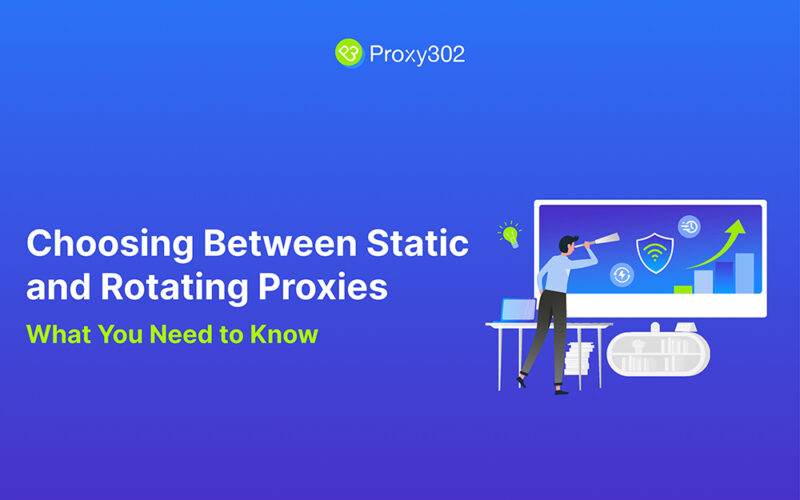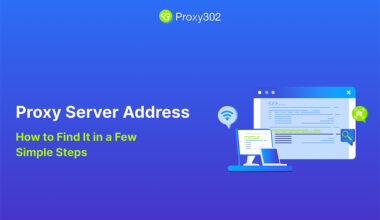In the digital age, where data is the new oil, protecting your online identity and accessing global content have become paramount. This is where proxy servers step in, acting as intermediaries between your device and the internet. But not all proxies are created equal. Enter static and rotating proxies—two distinct types that cater to different needs. In this article, we’ll explore the key differences between static and rotating proxies, their use cases, and how Proxy302‘s unique features can enhance your proxy experience.
What Is Static Proxy?
Static proxies, as the name suggests, provide a fixed IP address that remains constant for the duration of its usage. This means every time you connect to the internet through a static proxy, you appear to be using the same IP address.
How Static Proxies Work
Static proxies work by assigning a single IP address to a user or device. This IP address does not change unless manually altered by the proxy provider. This consistency is invaluable for tasks that require a stable and persistent online presence.
Typical Use Cases for Static Proxies

Static proxies are ideal for:
- Web Scraping: When scraping websites that require consistent IPs for login sessions.
- SEO Monitoring: Maintaining a stable IP helps in tracking search engine rankings without frequent blocks.
- Ad Verification: Ensures that ads are displayed correctly across different locations.
What Is Rotating Proxy?
Rotating proxies or dynamic proxies, on the other hand, provide a rotating IP address. With each request or at set intervals, the IP address changes, offering a fresh online identity.
How Rotating Proxies Work
Rotating proxies cycle through a pool of IP addresses, which can be beneficial for tasks requiring anonymity or high-volume data extraction. This rotation helps in evading blocks and bans from websites that limit the number of requests from a single IP.
Typical Use Cases for Rotating Proxies

Rotating proxies are best suited for:
- Data Mining: Collecting large datasets from websites without getting banned.
- Market Research: Gathering competitive intelligence from multiple sites without revealing your identity.
- Social Media Management: Managing multiple accounts without risking bans due to IP duplication.
Key Differences Between Static and Rotating Proxies

| Aspect | Static Proxies | Rotating Proxies |
|---|---|---|
| IP Stability and Rotation | Provides a stable IP address, ideal for tasks requiring a consistent identity. | Offers rotating IP addresses, perfect for maintaining anonymity. |
| Privacy and Security Levels | Useful for tasks needing consistency but may expose users to tracking if flagged. | Enhances privacy by frequently changing IPs, reducing tracking risks. |
| Performance and Speed | Generally faster due to maintaining a single connection. | May experience slight delays due to IP switching, but often negligible. |
| Cost Implications | Often involves fixed pricing models. | More cost-effective with pay-as-you-go options, like those from Proxy302. |
Use Cases for Static Proxies
Static proxies are particularly beneficial in scenarios where a stable IP is crucial. For example, businesses conducting SEO analysis benefit from static proxies by consistently tracking their website’s performance across different regions. Similarly, financial institutions often use static proxies for secure transactions and to maintain a consistent online presence.
Use Cases for Rotating Proxies
Rotating proxies shine in environments requiring high anonymity and data extraction. E-commerce companies use Rotating proxies for price comparison and monitoring competitors’ offerings. Digital marketers benefit from rotating proxies when managing multiple social media accounts, ensuring each account appears to operate from a different location.
Choosing the Right Proxy for Your Needs
Selecting between static and rotating proxies depends on your specific requirements. Consider the following factors:
- Task Nature: Is a stable identity more critical, or is anonymity your priority?
- Budget: Rotating proxies with a pay-as-you-go model, like Proxy302, might offer more flexibility.
- Data Volume: For high-volume tasks, rotating proxies can provide better coverage and less chance of IP blocks.
Conclusion
Understanding the differences between static and rotating proxies is essential for optimizing your online activities. Static proxies offer stability and consistency, while rotating proxies provide anonymity and flexibility. With Proxy302, you have access to over 65 million IPs globally, comprehensive proxy types including city-level targeting residential proxies, and a flexible pay-as-you-go model that eliminates the need for monthly subscriptions. Whether you’re a business looking to enhance your digital strategies or an individual seeking privacy, Proxy302 has the solution.
Experience the most flexible global premium proxy service today. 👉 Start Your Free Trial Now 👈with Proxy302 and discover the power of a proxy solution tailored to your needs.









3 comments
Your article helped me a lot, is there any more related content? Thanks!
Your point of view caught my eye and was very interesting. Thanks. I have a question for you.
Thank you for your sharing. I am worried that I lack creative ideas. It is your article that makes me full of hope. Thank you. But, I have a question, can you help me?